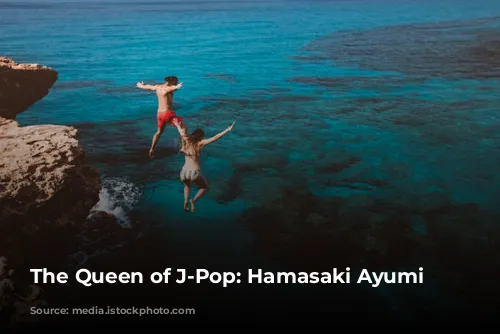If you’ve ever been to Japan, you’ve probably seen her face. A big, vacant stare, like a lemur caught in headlights. Is she real or a robot? The look is strangely alluring, particularly to younger fans, and one reason they want to buy a Tsu-ka mobile phone. Add her unique, husky Minnie Mouse voice, and you get the essence of Hamasaki Ayumi.
But don’t let the image fool you. This is a J-Pop star with a difference. She’s not just a pretty face; Ayumi writes her own lyrics, and in them, she’s not afraid to speak her mind. She’s a fashion trendsetter, earning the admiration of schoolgirls across the country. Her massive popularity helped her record label, Avex, become one of the biggest in Japan.

From Rock to Soul
Ayumi grew up in Fukuoka, southern Japan, listening to her older brother’s rock music collection, including bands like Led Zeppelin and Deep Purple. However, like the singer Utada Hikaru, she later found herself drawn to the soulful sounds of artists like Babyface and En Vogue. She spent time in New York taking vocal lessons, an experience that helped cultivate her self-assurance and independent spirit. She returned to Japan in 1998, ready to make her debut. Within a few years, she had released more than a dozen singles and several albums, solidifying her place in the music industry.

The Ups and Downs of Fame
Getting to the top of the J-Pop world is one thing; staying there is another. Ayumi’s success wasn’t without its challenges. She faced criticism for her “diva” image, and her controlling personality. These perceptions were perhaps understandable given how the Japanese music industry operates, with record labels holding the reins, and singers and bands treated as cash cows. She was also hit with controversy when she scolded a fan at a concert for being in the front row. The fan, it turned out, was disabled, and the story was quickly picked up by gossip outlets and online rumor mills.

A Comeback Queen
Despite the setbacks, Ayumi refused to be kept down for long. Her relationship with Nagase Tomoya, from the popular Johnny’s band Tokio, kept her in the public eye, with reporters speculating about their imminent marriage, even after they split in 2007. She made a concerted effort to improve her public image, appearing in more TV and radio shows. She even designed a cartoon character, “Ayupan,” modeled after herself, which became an instant hit with high school girls.

Facing Adversity Head-on
Ayumi’s songwriting is always honest, reflecting her personal experiences, the good and the bad. She cites Nicholas Cage and his dark cult classic, “Leaving Las Vegas,” as personal favorites. Her career was threatened when a long-standing hearing problem turned out to be more serious than she initially thought. In early 2008, she revealed to her fans that she had lost hearing in her left ear but that she would continue to perform.

A Legacy of Success
Her success continued unabated. In October 2010, her 50th single became her 25th consecutive No.1 on the Oricon chart, breaking a 22-year-old record set by Matsuda Seiko in 1988. At that time, she had sold over 21.38 million singles and 49.19 million albums, a staggering testament to her popularity. Despite her unique image and outspoken nature, Ayumi has proven herself to be a force to be reckoned with in the J-Pop world. She continues to captivate audiences with her powerful vocals, honest lyrics, and her unwavering determination to stay true to herself.









